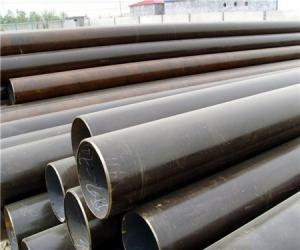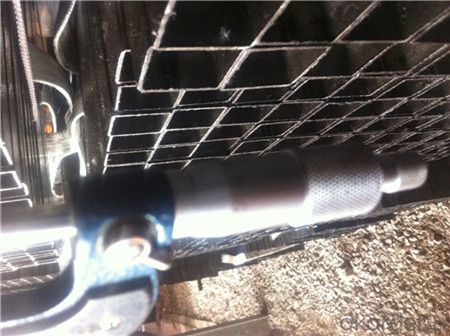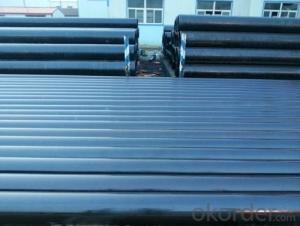Square Pipe GB/T 14976-2002, GB/T 14975-2002, GB/T3901
- Loading Port:
- Tianjin
- Payment Terms:
- TT or LC
- Min Order Qty:
- 25 m.t.
- Supply Capability:
- 15000 m.t./month
OKorder Service Pledge
OKorder Financial Service
You Might Also Like
1、Structure of Square Pipe GB/T 14976-2002:
Seamless pipe is formed by drawing a solid billet over a piercing rod to create the hollow shell. As the manufacturing process does not include any welding, seamless pipes are perceived to be stronger and more reliable. Historically seamless pipe was regarded as withstanding pressure better than other types, and was often more easily available than welded pipe.
2、Main Features of Square Pipe GB/T 14976-2002:
• High manufacturing accuracy
• High strength
• Small inertia resistance
• Strong heat dissipation ability
• Good visual effect
• Reasonable price
3、Square Pipe GB/T 14976-2002 Specification:
Standard | GB, DIN, ASTM ASTM A106-2006, ASTM A53-2007 |
Grade | 10#-45#, 16Mn 10#, 20#, 45#, 16Mn |
Thickness | 8 - 33 mm |
Section Shape | Round |
Outer Diameter | 133 - 219 mm |
Place of Origin | Shandong, China (Mainland) |
Secondary Or Not | Non-secondary |
Application | Hydraulic Pipe |
Technique | Cold Drawn |
Certification | API |
Surface Treatment | factory state or painted black |
Special Pipe | API Pipe |
Alloy Or Not | Non-alloy |
Length | 5-12M |
Outer Diameter | 21.3-610mm |
Grade | 20#, 45#, Q345, API J55, API K55, API L80, API N80, API P110, A53B |
Standard | ASME, ASTM |
1) Material:20#(ASTM A 106/A53 GRB.API5LGRB,GB),45#,16Mn,10#.
2) Specification range:OD:21.3-610mm,WT:6-70mm,length:6-12m or according to the requirement of clients.
3) Excutive standards:GB,ASME API5L.ASTM A 106/A53,Despite of the above standards,we can also supply seamless steel pipe with standard of DIN,JIS,and so on,and also develop new products according to the requirements of our clients!
4) Surface:black lacquered,varnish coating or galvanized.
5) Ends:Beveled or square cut,plastic capped,painted.
6) Packing:bundles wrapped with strong steel strip,seaworthy packing.
4、Packaging & Delivery
Packaging Details: | seaworthy package,bundles wrapped with strong steel strip |
Delivery Detail: | 15-30days after received 30%TT |
5、FAQ of Square Pipe GB/T 14976-2002:
①How is the quality of your products?
Our products are manufactured strictly according to national and internaional standard, and we take a test
on every pipe before delivered out. If you want see our quality certifications and all kinds of testing report, please just ask us for it.
Guaranteed: If products’ quality don’t accord to discription as we give or the promise before you place order, we promise 100% refund.
②How about price?
Yes, we are factory and be able to give you lowest price below market one, and we have a policy that “ for saving time and absolutely honest business attitude, we quote as lowest as possible for any customer, and discount can be given according to quantity”,if you like bargain and factory price is not low enough as you think, just don’t waste your time.Please trust the quotation we would give you, it is professional one.
③Why should you chose us?
Chose happens because of quality, then price, We can give you both.Additionally, we can also offer professional products inquiry, products knowledge train(for agents), smooth goods delivery, exellent customer solution proposals.Our service formula: good quality+good price+good service=customer’s trust
SGS test is available, customer inspection before shipping is welcome, third party inspection is no problem.
6、Square Pipe GB/T 14976-2002 Images:
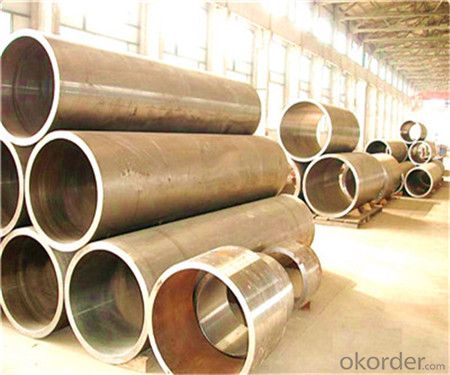
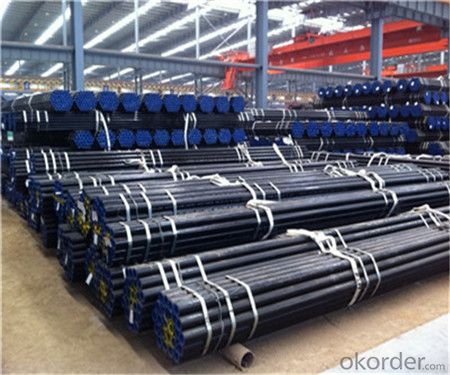
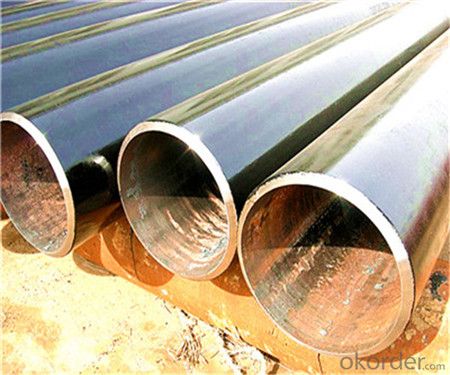
- Q: Can steel pipes be used for sewer systems?
- Yes, steel pipes can be used for sewer systems. However, they are less commonly used compared to other materials such as PVC or concrete pipes. Steel pipes are generally used for larger diameter sewer lines or in specific situations where they are preferred due to their strength and durability.
- Q: How do steel pipes handle extreme temperatures?
- Steel pipes are highly durable and can handle extreme temperatures due to their inherent strength and heat resistance. They have a high melting point, allowing them to withstand both very high and very low temperatures without compromising their structural integrity. Additionally, steel pipes have excellent thermal conductivity, which enables them to efficiently transfer heat and prevent damage caused by extreme temperature fluctuations.
- Q: What are the advantages of using pre-fabricated steel pipes?
- Using pre-fabricated steel pipes in various applications has several advantages. Firstly, these pipes offer a high level of durability and strength due to the robustness and resistance of steel to external forces. This makes them ideal for withstanding high pressure or heavy loads, resulting in a longer lifespan compared to other materials and reducing the need for frequent replacements and maintenance. Secondly, pre-fabricated steel pipes provide excellent corrosion resistance by being coated with protective layers like galvanization or epoxy, preventing rusting and corrosion. This is especially important in industries or environments where the pipes may come into contact with moisture, chemicals, or other corrosive substances. By utilizing pre-fabricated steel pipes, the risk of leaks, deterioration, or failure due to corrosion is significantly reduced. Another advantage of these pipes is their versatility and ease of installation. They are manufactured to precise specifications before being delivered to the site, allowing for quick and efficient installation. Their modular nature enables easy assembly, disassembly, and reconfiguration, making them suitable for a wide range of applications. Additionally, pre-fabricated steel pipes can be seamlessly integrated with other building components, reducing installation time and costs. Furthermore, pre-fabricated steel pipes are more environmentally friendly compared to other materials. Steel is highly recyclable, and using pre-fabricated pipes reduces the consumption of natural resources and energy required for production. The long lifespan of steel pipes also reduces waste generation and the need for frequent replacements, contributing to sustainability efforts. Lastly, pre-fabricated steel pipes offer cost advantages. Although the initial cost may be higher than some other materials, their durability and low maintenance requirements result in long-term cost savings. The reduced need for repairs, replacements, and maintenance, along with the ease of installation, lead to lower overall project costs and reduced downtime. In summary, the advantages of pre-fabricated steel pipes include durability, corrosion resistance, versatility, ease of installation, environmental friendliness, and cost-effectiveness. These benefits make them the preferred choice for various industries and applications.
- Q: How are steel pipes used in the manufacturing of boilers and heat exchangers?
- Boilers and heat exchangers rely on steel pipes as an essential component due to their exceptional properties and capabilities. These pipes are specifically designed to endure high temperatures, pressures, and corrosive environments, making them highly suitable for these purposes. When constructing boilers, steel pipes are employed to form the main body or shell. This shell contains the water or steam that is heated to generate heat or produce steam for diverse industrial processes. The steel pipes used in boilers are typically seamless or welded, possessing precise dimensions and exceptional strength to ensure structural integrity and prevent any potential leaks. Heat exchangers, on the other hand, are devices used for transferring heat between two fluids, often with varying temperatures. Steel pipes are utilized in heat exchangers as the primary medium for heat transfer. The pipes are commonly arranged in a pattern, allowing the hot fluid to pass through one set of pipes while the cold fluid passes through another set. This arrangement facilitates efficient heat transfer between the two fluids. The use of steel pipes in boilers and heat exchangers provides numerous advantages. Firstly, steel pipes exhibit excellent thermal conductivity, enabling efficient heat transfer between the fluid and the surrounding environment. Secondly, steel pipes possess high tensile strength and can withstand high pressures, ensuring the safety and reliability of the equipment. Thirdly, steel pipes are highly resistant to corrosion, which is crucial in environments where the processed fluids are corrosive or contain impurities. Furthermore, steel pipes can be easily fabricated and customized to meet the specific requirements of boilers and heat exchangers. They can be manufactured in various sizes, lengths, and thicknesses to accommodate diverse applications. Additionally, steel pipes can be coated or lined with materials such as ceramic or epoxy to provide additional protection against corrosion or abrasion. In conclusion, steel pipes play a crucial role in the manufacturing of boilers and heat exchangers. Their exceptional properties, including high strength, thermal conductivity, and corrosion resistance, make them the optimal choice for these applications. The use of steel pipes ensures the efficient operation, safety, and longevity of boilers and heat exchangers in various industrial processes.
- Q: How long is the seamless tube?
- Generally finished seamless steel tubes are less than twelve meters, mainly for the convenience of shipment.In times of rolling (processing), the steel pipe can reach 80 meters or longer.
- Q: How do steel pipes compare to other types of piping materials?
- Steel pipes are highly durable and have excellent strength, making them superior to other types of piping materials in terms of longevity and resistance to extreme conditions. They are also more cost-effective, as steel pipes require less maintenance and have a longer lifespan. Additionally, steel pipes have better corrosion resistance, making them ideal for various applications, especially in industries where chemical exposure is common.
- Q: What is the creep resistance of steel pipes?
- The creep resistance of steel pipes refers to their ability to withstand deformation or elongation over time when subjected to high temperatures and constant stress. Steel pipes are known for their excellent creep resistance due to the inherent strength and stability of the material. The specific creep resistance of steel pipes can vary depending on factors such as the alloy composition, heat treatment, and the operating conditions they are exposed to. Creep is a phenomenon that occurs at elevated temperatures where materials slowly deform under constant stress. In the case of steel pipes, this can be a concern in applications where they are exposed to high temperatures for prolonged periods, such as in power plants, industrial furnaces, or steam pipelines. The resistance to creep deformation is crucial to ensure the structural integrity and longevity of the pipes. Steel pipes are often designed and manufactured with alloys that have high creep resistance properties, such as chromium-molybdenum (Cr-Mo) steels or nickel-based alloys. These alloys exhibit excellent mechanical strength, good thermal stability, and resistance to oxidation and corrosion, all of which contribute to their superior creep resistance. Furthermore, heat treatment processes like quenching and tempering can significantly enhance the creep resistance of steel pipes. These treatments involve controlled heating and cooling cycles that optimize the microstructure of the steel, increasing its resistance to deformation and improving its overall performance at high temperatures. It is important to note that the creep resistance of steel pipes is typically specified by industry standards and codes, such as the American Society of Mechanical Engineers (ASME) Boiler and Pressure Vessel Code. These standards define the allowable stress levels and design criteria for various steel pipe applications, ensuring that they meet the required safety and performance standards. In summary, steel pipes are known for their excellent creep resistance due to their inherent strength, stability, and resistance to high temperatures. The specific creep resistance of steel pipes can vary depending on factors such as alloy composition, heat treatment, and operating conditions. Proper design and adherence to industry standards are crucial to ensuring the desired creep resistance and overall performance of steel pipes in various applications.
- Q: What are the different methods of welding steel pipes?
- There are several methods of welding steel pipes, including arc welding, TIG (tungsten inert gas) welding, MIG (metal inert gas) welding, and oxy-fuel welding. Each method has its own advantages and applications, depending on factors such as the thickness of the steel, the desired strength of the weld, and the available equipment.
- Q: Can steel pipes be used for conveying gases?
- Yes, steel pipes can be used for conveying gases. Steel pipes are commonly used in various industries, including oil and gas, petrochemical, and construction, for transporting various types of gases such as natural gas, air, and hydrogen. Steel pipes offer several advantages for gas transportation. They are strong and durable, able to withstand high pressure and temperature conditions. Steel pipes also have excellent resistance to corrosion and can effectively prevent gas leakage, ensuring the safety and reliability of the gas transportation system. Additionally, steel pipes have a smooth internal surface, which minimizes the frictional resistance and allows for efficient gas flow. Overall, steel pipes are a reliable and widely-used option for conveying gases in various applications.
- Q: What are the disadvantages of using steel pipes?
- One major disadvantage of using steel pipes is their susceptibility to corrosion. Over time, exposure to moisture and certain chemicals can cause the steel to rust, leading to structural weakness and potential leaks. Another drawback is the high cost of steel pipes compared to alternative materials such as plastic or copper. Additionally, steel pipes are relatively heavy and can be challenging to handle and transport.
Send your message to us
Square Pipe GB/T 14976-2002, GB/T 14975-2002, GB/T3901
- Loading Port:
- Tianjin
- Payment Terms:
- TT or LC
- Min Order Qty:
- 25 m.t.
- Supply Capability:
- 15000 m.t./month
OKorder Service Pledge
OKorder Financial Service
Similar products
Hot products
Hot Searches
Related keywords
